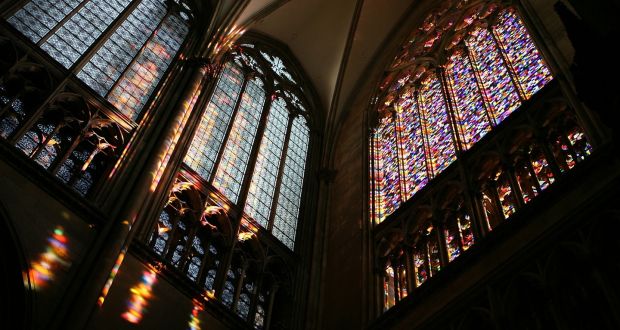It is fending off calls for women priests and blessings of same-sex couples amid criticism of its handling of sex abuse cases

By Derek Scally
On a sunny Sunday evening in May, 80 people gathered in a Berlin church for a calm Catholic revolution. At 6pm the 11 metre-high wooden doors of the modernist church of St Canisius were opened for an inclusive Mass of blessing. Spaced out in pairs around the airy church were mainly same-sex couples, all looking ahead at the lanky Jesuit priest.
With expectation in the air, Fr Jan Korditschke removed his face mask and, wearing a broad smile, spread his arms and invited all present to join him in celebrating love. His sermon drew on John’s Gospel, that love is from God, and that it is not in the purview of a priest or a pope to deny the God-given blessing of love.
“God is present in love and and loving couples are already blessed with the presence of God. I am just giving it a framework through this rite,” he said.
Afterwards, with two assistants Korditschke worked his way through the church, talked briefly to each couple before praying together. Behind medical masks many tears flowed.
“It was such a relief, like a stone was rolling away from my heart,” said one man, Georg, alongside his partner afterward.
The Berlin Mass was the last in a series of services across Germany under the banner #liebegewinnt – love wins. The services were triggered by a Vatican document from March restating Catholic teaching that homosexual acts are disordered and blessings for same-sex unions are impossible.
One attendee, Robert, said he came with his partner in protest at the document’s key sentence that “God does not and cannot bless sin”. “By posing a question no one asked, just to answer it in such cold language,” he said, “Rome tried to ram home its point but have triggered a reaction they didn’t expect.”
A few feet away 15 young men and one middle-aged woman held a large hand-written banner reading “God cannot bless sin” and recited the rosary during the Mass. One protester, who declined to give his name, said that obedience to papal teaching is what has held the Catholic Church together for two millennia.
“I worry that carry-on like this,” he said, with a nod to the emerging massgoers, “will bring us toward another schism.”
Papal authority
Exactly 500 years ago, the renegade Augustinian monk Martin Luther was ordered in public to submit to this absolute papal authority by recanting his claims of corrupt church practice and flawed teaching.
Luther turned the tables on Rome by demanding they prove that his scripture-based understanding of the Christian faith was false. The confrontation spiralled and his challenge became a channel for a host of political and modernising forces. Western Christianity split and the world was never the same again.
History doesn’t repeat itself; in a largely secular Europe, most people would struggle to spell schism, let alone see any relevance for their lives. Still, something is brewing in the land of the Reformation as individual protests within the church of Rome feed into each other to create a crackling, Catholic conflagration.
German bishops appear unsure like never before as to where their loyalties lie. Should they deploy the Roman fire blanket, suffocate the flames and denounce critics as arsonist apostates? Or does their survival hinge on embracing the protest and facing down Rome?

Like their Irish colleagues, the German bishops’ fumbled response to clerical sexual abuse allegations and their cover-up in the past decade has drained away credibility and public support.
Nowhere is the struggle more visible – or the stakes higher – than in the western city of Cologne. For centuries its hulking Gothic cathedral has been a touchstone of German Catholicism. For many German believers, though, Cologne is now the epicentre of institutional dysfunction and denial, in particular over the scale of clerical child abuse and the systematic nature of its cover-up.
Last year Cologne’s conservative archbishop, Cardinal Rainer Maria Woelki, came under fire for suppressing a report he himself commissioned into clerical sexual abuse. A replacement report followed this year and triggered two bishops’ departure, but critics say this document was careful to avoid any analysis of whether church structures were a contributory factor to abuse. Tensions continue to build.
In January a local priest, Klaus Koltermann, wrote to Cardinal Woelki, warning of “disquiet among the greatest believers” in his parish of Dormagen, 20 minutes north of Cologne. When a local newspaper reprinted his letter, Koltermann’s superiors warned of “possibly serious breaches of your service obligations . . . that could have consequences”.
The threat was withdrawn when the priest went public with their correspondence, a stand-off he describes as a learning experience. “A new solidarity has to grow amongst us,” he told The Irish Times. “We have to become more courageous. Sadly, we priests never learned to stand up for our faith – in the church.”
In defiance
Such cases of conscience-led insubordination are gaining momentum. Two weeks ago Catholics at an ecumenical gathering with Germany’s Lutherans held joint eucharistic celebrations in defiance of their bishops.
This week a parish in Düsseldorf wrote to Cardinal Woelki disinviting him as celebrant at their confirmation Mass next month. Woelki once served as a deacon in the parish, as did two abusing priests. In their letter, some 140 parishioners said they feared the cardinal would “instrumentalise” their children’s confirmation to hit back at his critics.
“You are for us, sadly, no longer credible, we have lost our trust in you as a bishop,” they wrote.
Unlike in other countries, German Catholics have a clear way to express a vote of no-confidence with the Kirchenaustritt (church departure). All Christian church members in Germany automatically pay a so-called “church tax” in a system dating back to the 19th century, calculated at 8 per cent of their income tax. Effectively a membership fee, it earns Germany’s Catholic Church some ¤6 billion annually. Revoking the payment is seen as revocation of church membership.
The number of annual departures in 2019 was 218,000, twice the number of a decade ago. Numbers for 2020 have yet to be collated but, based on anecdotal evidence, the ongoing abuse debate has prompted an unprecedented rush for the exits.
Already facing a ticking demographic time bomb, Catholic bishops announced a “synodal process” in 2019 to discuss the road ahead. With 230 members (lay and religious) discussions are under way in four groups examining the role of priests, church power, sexuality and women in ministry. The pandemic shifted discussions online but organisers hope in-person gatherings can begin from September, with the first votes on proposals by Christmas.
For Bishop Georg Bätzing, head of the German episcopate, the “synodal path” is a balancing act between church liberals and traditionalists – with Rome looking on warily.

His relief was palpable this week when Pope Francis announced plans for a worldwide synodal consultation. This, said the German bishop, was proof that “we are neither schismatic nor do we as a German national church want to loosen ourselves from Rome”.
Expectations of the process are modest, however, given two emergency brakes built into the process: any decisions from the synodal path require unanimous backing of bishops, then approval from Rome.
Church strike
Rather than wait for reform from within, Lisa Kötter began a church strike two years ago, out of which has grown a grassroots movement called Maria 2.0. Two years on, with regular protests and prayer services, Maria 2.0 has gone global with its demands for the inclusion of women in all church functions, an end to mandatory celibacy, and a consequential response to clerical sexual abuse.
“We see the entire patriarchal basis of the Catholic Church as wrong and not inclusive, out of step with the teaching of Jesus,” said Kötter.
It’s a measure of the movement’s effect that it already has a conservative countermovement, Maria 1.0. And, after initial icy silence, Kötter has been invited to private meetings with bishops. But the friendly conversation always reaches a dead end, she says, when conversation turns to the main bone of contention: church privileges and power that men claim for themselves.
With calls for women priests and blessing same-sex couples, Kötter and Fr Korditschke push back against the idea that they are part of a Luther 2.0 movement. Neither wants a break with Rome but, then again, neither did the man who became the face of the Reformation.
Korditschke says Germany’s Lutheran churches, with more liberal positions on women ministers and social questions, have raised expectations among local Catholics — and tensions when change comes slowly, or not at all.
“I look to Jesus, who was respectful of religious leaders and the sabbath but not afraid of conflict when it came to prioritising the good of people,” said Korditschke, who was baptised Lutheran, converted to Catholicism aged 16 and has no plans to return.
“I don’t see myself at odds with the Catholic Church and, unlike Martin Luther, I pray every day for the pope and serve my church. This is my home.”
After lighting a fuse in Germany two years ago, Kötter sees neither the structural means nor political appetite for reform among German Catholic bishops. She dismisses the synodal path as a “simulation”.
“They haven’t heard the sign of the times, the demands for change. Their ears are trained to hear nothing except their own hymns.”
Complete Article ↪HERE↩!
